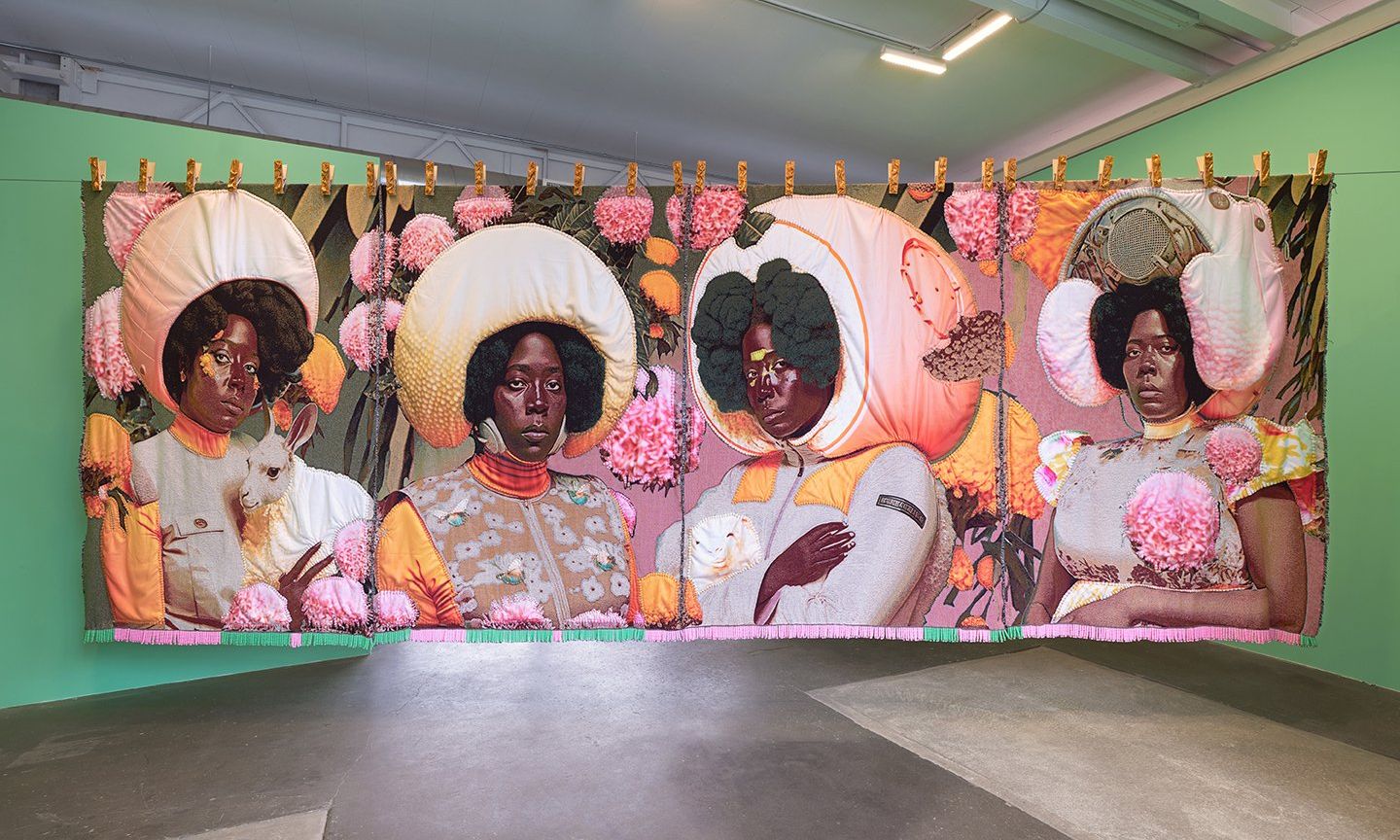Installation view of April Bey, We Learned To Love Ourselves Until We Were Full Until We Did Not Need Yours Untill We Realized Our Own Was Enough (2023)
Photo: Brica Wilcox
The Museum of Art, Architecture and Technology (MAAT) in Lisbon is bringing together works by 11 artists from the African diaspora for its exhibition Black Ancient Futures, opening this month.
The exhibition aims to delve into the creative possibilities that come from the sharing of ideas between different African cultures and others across the world. The artists featured—among them April Bey, Gabriel Massan, and Kiluanji Kia Henda—live or were born within international communities including those of Nigeria, Brazil, Angola, the Bahamas and the Democratic Republic of Congo.
“The show came into being from the desire to recover the possibility of abundance, of celebration and wellbeing,” Camila Maissune, a co-curator of the exhibition, says. “In this way, mythology, history, fiction, science, technology and ecology became guides for our selection of artists whose works do not mask the cruel problem of colonial oppression and pillage, exploitation and violation (of beings, cultures, and resources), nor do they hide they persistent difficulties of affirming Black identities today.”
The show will take place in MAAT’s two buildings, MAAT Gallery and MAAT Central, as well as the museum’s gardens, which will display works by Jota Mombaça and Nolan Oswald Dennis. The gardens are also the setting for Jeannette Ehlers’s performance piece, We’re Magic. We’re Real #3 (These Walls) (2021), which will take place on 17 September. The work by the Danish-Trinidadian artist, developed in 2020, uses hair as a significant and powerful identity marker among the African diaspora, embodying tradition and lineage. Ehlers is known for her works addressing themes such as colonialism, memory and race.
Jeannette Ehlers, We’re magic. We’re real #3 (These Walls), accompanied by performers Eve Tagny and Sophia Gaspard, as part of Momenta 2023
Photo: Michael Patten
Another highlight is Lungiswa Gqunta’s piece Sleep in Witness, which, according to Joǎo Pinharanda—the director of MAAT and the other co-curator of the show—is a work “conceived in situ, consolidating a series of previous projects”. It challenges, Pinharanda continues, the viewer to think of sleep and dreams as spaces that allow us to experience new ways of being, outside and beyond the condition of colonial dispossession and loss.
The exhibition examines the dominant aesthetic representations of Africa by re-envisioning the Black cultural artistic experience in the past, present and future. Each of the artists, some of whom are showing in Portugal for the first time, interrogate geographical hierarchies and reflect on utopian dreams of “well-being and abundance”, through immersive and interdisciplinary works, performances and site-specific installations.
“We were interested in artists who had a wide-ranging discourse on pre-eminent issues that concern the reality of the African diaspora,” Maissune says. “Artists from different generational, social, geographical and cultural backgrounds but also artists whose critical stance covered global matters common to humanity today, from the invasion of new technologies to healing and purification strategies, and the possibility of building a utopian future that liberates bodies and spirits,” Maissune says.
Maissune also emphasises the way the way the show reflects Portugal’s history. “As the first colonising country (15th century) and the last to liberate its colonies (1975), Portugal has not yet clearly and transparently embraced its past. The exhibition takes place in an exceptional urban setting: next to the beaches from which the colonisation ships set sail and next to a series of monuments that recall and celebrate this colonial past, including a square that still bears the name Praça do Império (Imperial Square).”
It is not the first time that MAAT has interrogated this topic, with previous exhibitions such as Grada Kilomba’s O Barco/The Boat (2021) and Interferências (2022). However, Black Ancient Futures has a globalist lens. The curators hope that the international dimension of the exhibition amplifies their ambition to generate new and urgent debates.
• Black Ancient Futures, Museum of Art, Architecture and Technology, Lisbon, 18 September-17 March 2026

